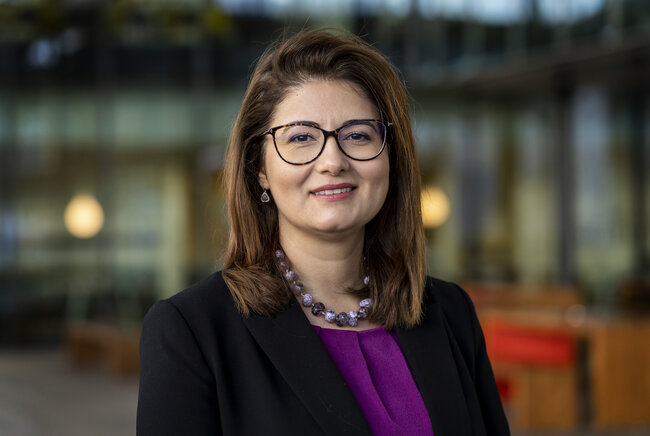AiNed Fellowship Grant for Aida Todri-Sanial
The research focuses on developing a novel sense-to-compute paradigm with ONNs

The fellowship will enable TU/e professor Aida Todri-Sanial to soon start the research project ‘AI-on-ONN: Online Learning for Sense-to-Compute Edge AI with Oscillatory Neural Networks’. With the growing number of sensors in smart systems, she looks forward to contributing to rethinking how we compute and process these signals in an energy efficient way. The AiNed Fellowship Grants are a program component of the AiNed National Growth Fund program. The aim of this program is to attract AI talent to Dutch academic research institutions in view of international competition for AI talent.
Sensing the environment around us is vital for the next generation of edge AI, where devices can perceive and reason. It is estimated[1] that the next wave of the AI revolution will stem from analog-driven industrial electronics with 45 trillion embedded sensors by 2030. But analog data is growing faster than our ability to process and use the data, creating an ‘analog data deluge’. Sensor-based industries and technologies are experiencing exponential growth on sensor-based edge AI devices that will generate > 1 million of zettabytes of data/year. Transferring such vast raw sensor data to cloud faces limitations in bandwidth, energy, privacy concerns, and latency. These challenges prompt the question – can we rethink computing at the edge to enable seamless analog sensor integration, energy efficient processing of sensor data, and online learning for perception and reasoning? Addressing these challenges will unlock versatile functionalities in edge AI with embedded sensors.
Novel computing paradigm
Current computing, based on the von Neumann architecture, is energy demanding, resource-intensive and unsuitable for edge deep learning. Over the last years, Todri-Sanial has explored and developed a novel computing paradigm where programs (functions) are directly mapped into the computational hardware, based on the principle ‘let physics do the computing’. This paradigm utilizes oscillatory neural networks (ONNs) and encodes information in phase. This novel computing paradigm solves complex mathematical functions. The challenge she would like to address in this fellowship is to investigate if ONNs can allow a seamless sense-to-compute paradigm.
Primary operational necessity
Edge AI computing will soon become the primary operational necessity for many organizations. Projected worldwide[2] spending on edge computing is ~ $250 billion and growing at a CAGR of 10%. To achieve its full potential, edge computing needs energy efficient online learning and sensing capability (currently unavailable due to the large amount of data to be transferred to the cloud, limited bandwidth, privacy, and high energy requirement). Edge computing with online learning and sensing capability will provide flexibility for organizations to achieve greater data sovereignty, greater autonomy, better security and better latency while unlocking a variety of applications that rely on real-time data processing. This is a timely opportunity for edge AI computing architecture and Todri-Sanial hopes to contribute to this challenge with her research on sense-to-compute ONN paradigm. This novel sense-to-compute paradigm with ONNs will allow to rethink the computing architecture for edge AI. The Eindhoven Artificial Intelligence Systems Institute (EAISI)covers a wide spectrum of AI research and this project brings the focus on the hardware and computing architecture for executing AI tasks.
Personally, I am honored to have this opportunity to take the ONN computing paradigm to the next level. Over the last several years, I have been working with my team and international collaborators on developing ONN computing covering aspects from computing models, algorithms and its physical implementation in hardware. This fellowship is a great boost to allow to develop this novel sense-to-compute paradigm with ONNs and assess its pros and cons in edge AI.
About the AiNed Fellowship grants
The AiNed Fellowship grants help Dutch academic knowledge institutions to attract AI-talents who are usually able to choose between several competitive job offers. The focus is on exceptional AI-talents who can be deployed in an AI-discipline, ranging from technology to the social sciences and humanities. The AiNed Fellowship grants will increase the number of PhDs and postdoc researchers at Dutch academic knowledge institutions who focus on the challenges that are part of the AI Research Agenda for the Netherlands (AIREA-NL). The AiNed Fellowship grants from the National Growth Fund program consolidate the knowledge and education base in the area of AI in the Netherlands and strengthen the national AI ecosystem.
[1] Decadal Plan for Semiconductors Report, 2021 https://www.src.org/about/decadal-plan/
[1] McKinsey Technology Trends Outlook 2022, website